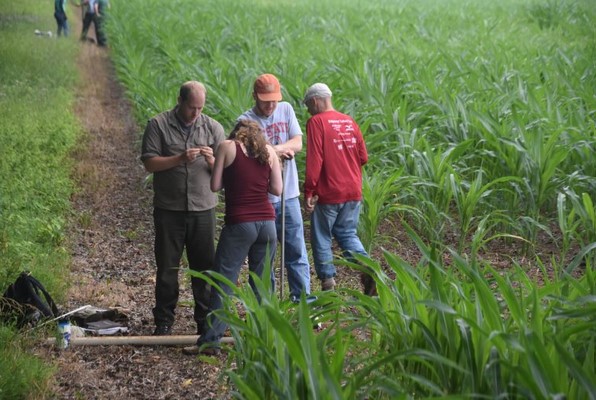Seven Reasons to Dig a Soils Career
go.ncsu.edu/readext?723281
en Español / em Português
El inglés es el idioma de control de esta página. En la medida en que haya algún conflicto entre la traducción al inglés y la traducción, el inglés prevalece.
Al hacer clic en el enlace de traducción se activa un servicio de traducción gratuito para convertir la página al español. Al igual que con cualquier traducción por Internet, la conversión no es sensible al contexto y puede que no traduzca el texto en su significado original. NC State Extension no garantiza la exactitud del texto traducido. Por favor, tenga en cuenta que algunas aplicaciones y/o servicios pueden no funcionar como se espera cuando se traducen.
Português
Inglês é o idioma de controle desta página. Na medida que haja algum conflito entre o texto original em Inglês e a tradução, o Inglês prevalece.
Ao clicar no link de tradução, um serviço gratuito de tradução será ativado para converter a página para o Português. Como em qualquer tradução pela internet, a conversão não é sensivel ao contexto e pode não ocorrer a tradução para o significado orginal. O serviço de Extensão da Carolina do Norte (NC State Extension) não garante a exatidão do texto traduzido. Por favor, observe que algumas funções ou serviços podem não funcionar como esperado após a tradução.
English
English is the controlling language of this page. To the extent there is any conflict between the English text and the translation, English controls.
Clicking on the translation link activates a free translation service to convert the page to Spanish. As with any Internet translation, the conversion is not context-sensitive and may not translate the text to its original meaning. NC State Extension does not guarantee the accuracy of the translated text. Please note that some applications and/or services may not function as expected when translated.
Collapse ▲While lab positions exist, most jobs in soils require you to get out of the office and get hands-on. If you prefer an office outdoors to a 9 to 5 job in a cubicle, soils might be for you. “It’s hard, sometimes dirty work that requires a solid science background. It’s the only white-collar job I know of that gets dirty,” mused Jeff Vaughan, NC State University graduate and President of Agri-Waste Technology, Inc.
Working with soils offers the chance to affect our environment. Through environmental preservation, you can create lasting contributions that improve our planet. “If we lose beautiful places, what’s the point of being here? You have a chance to make a difference and create a place for all living things to thrive,” said. Dale Threatt-Taylor, NC State graduate and Executive Director for the Nature Conservancy in South Carolina.
If you love doing, rather than studying theory, soils is your chance to apply STEM knowledge in the real world. According to John Havlin, NC State professor of soil science, soil is a matrix of a variety of materials integrating the study of biology, chemistry, and physics. Soil careers require a solid science footing but also a fair amount of math calculation – a real integration of STEM concepts.
Soil is the foundation of life. “Life simply wouldn’t exist without it,” Havlin said. Making wise choices on human development impacts the entire world. If you enjoy the variety of earthly places and are interested in land stewardship, a soils career could be your best path.
The universal importance of healthy soil makes soil careers potential paydirt for graduates. Human development, suburban expansion, urban restoration, and wetland preservation provide an ongoing need for soil professionals. “There’s been a policy shift away from government regulation towards environmental services which requires a new crop of soils professionals,” said David Crouse, NC State’s director of undergraduate programs in the Department of Crop and Soil Sciences. The US Bureau of Labor projects 3-8% job growth in this category over the next 10 years, on pace or faster than most other fields.
The field of soil study branches in many directions. Opportunities exist in both field and lab settings with private businesses, government agencies, and non-profit groups. Positions range from laboratory scientists to entrepreneurial business leadership depending on your interests and skill set. “Soil study used to be focused on agriculture. But that has changed. There has been a dramatic increase in the environmental soil industry,” said Deanna Osmond, NC State Extension lead and graduate advisor.
7. You’re Good at Chemistry or Biology or Math or Environmental Science or Human Geography
Soil science is interdisciplinary. And it goes way beyond agriculture. This field bridges geology, chemistry, biology, statistics, and physics. “Most of our soils students aren’t farm kids. They are interested in environmental science and want a specialty that makes them a highly valued team member,” David Crouse said.
And Soils are FASCINATING! Learn More



